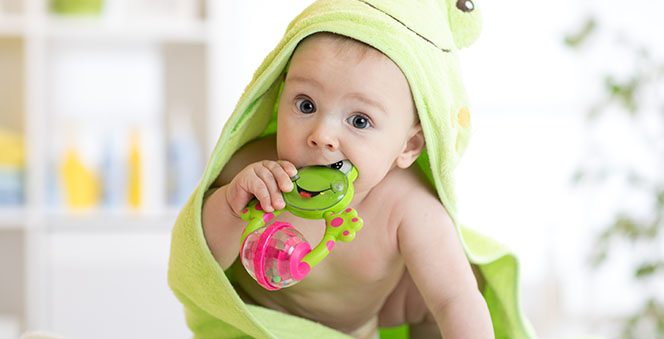Watching babies grow is a perfect delight. But at times the growth process might be hurtful and uncomfortable. One of the landmarks in the early years of a child’s life is teething. It is a happy moment for the parents but might cause discomfort to the child. Teething occurs between 6 to 24 months of age. In the case of some babies, it might start even earlier than that. During teething, a baby’s tooth breaks through from the gum. Teething, the sort of discomfort caused during the entire process, and the reaction of each baby might vary. But, knowing the general symptoms and remedies for them might help parents and children both go through with it subtly. Teething in Babies: Symptoms and Remedies
SIGNS OR SYMPTOMS OF TEETHING
The most normal thing that happens during teething; medically termed as Odontiasis is the baby likes to put things in the mouth because of irritability. So, whenever your baby starts chewing stuff more than usual you might get your first clue there. There might also be small red blisters over the gums of the broken tooth. Apart from these, the following are some common symptoms seen in a baby during teething:
- Decreased sleeping hours and restlessness while sleeping due to irritation in the gum.
- More drooling than usual.
- Swollen gums with light rashes.
- Fussiness in the baby’s behavior.
- Refusing to eat normal food but likes chewing items a lot.
- Repeatedly putting hands in the mouth and pressing the gum areas.
- Constantly rubbing ears due to pain caused by the eruption of the molar region.
- Slightly rise in temperature but high fever is not the symptom of teething.
- Irritated and crying more than usual.
During teething sometimes there might be fever, diarrhea, and rashes on the body. But they are not due to teething. So in these cases, the pediatrician shall be contacted for some medical consultancy.
REMEDIES TO EASE THE PAIN AND IRRITATION
Babies might get cranky during teething. During the first few days, the discomfort is more. There are a few things that might be done to make them a little bit more comfortable and ease their pain. There are simple tricks to do that and the outcome might vary. So, different things can be tried to help them feel better. Some of these remedies are:
- Put something cold in the baby’s mouth like a cold pacifier and wet washcloth.
- As babies like to chew items during teething and you should be careful about what they put in their mouth so, it’s a smart idea to let them chew a few things which will be beneficial to them at the same time.
- Massaging their gums before feeding them might give them relief for a short time.
- It is advised to add Fluoride to the baby’s diet after 6 months of age which will harden their tooth enamel and prevent the tooth from decaying.
- After the tooth has appeared, parents shall brush their teeth with fluoride toothpaste of the size of small grain.
- Giving them painkillers might not be the best idea so it’s advisable to go with the home remedies.
- After the first tooth has once appeared, it’s good to consult a pediatrician just in case. Teething is hard for babies as they are small and don’t know how to deal with the unease. And, the first time is the hardest one. But it gets better and gradually they will be more comfortable with the whole phenomenon. It’s not something to be very much concerned about but it’s always best to know about these little things and get one step ahead in comforting your child.
There is no denying that breastmilk has innumerable benefits for newborns. Breastfeeding transfers antibodies from the mother and strengthens the baby’s immune system, thereby safeguarding it against infectious diseases.




